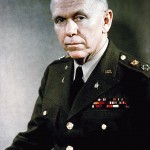Note: This article was orginally published in the Texas Military Forces publication The Dispatch
As overseas contingencies and operations lessen for our current military forces, many service members returning home may not only question his/her own future career, but that of the profession. Common questions may include a desire for one to predict the types of future conflicts or focus on overall costs of maintaining the most expensive defensive strategy in the world. Regardless of the era or generation, post-war transitions result in leaders providing tough answers to difficult questions, while keeping the well-being of the country a top priority. During these times of uncertainty, the U.S. needs strong leaders across all levels who adhere to attributes necessary to navigate these transitions. Through monumental achievements, ethical qualities and an extraordinary philosophy and managerial style, Gen. George C. Marshall serves as a model of such a leader.
 Before discussing the attributes and competencies contributing to revered success, it is important to provide some background and insight to the leader dubbed “a man for all seasons.” A shy and reserved youth and mediocre student at best, it was a love for history and a desire to seek advanced education at the Virginia Military Institute (VMI) that launched his career. Fast forward to the day Marshall became the U.S. Army Chief of Staff, at which time, Germany invaded Poland and ushered in World War II. Over a three-year period, Marshall transitioned the U.S. Army from 189,000 outmoded and ill-equipped soldiers into the 8,000,000-soldier force that won the war.
Before discussing the attributes and competencies contributing to revered success, it is important to provide some background and insight to the leader dubbed “a man for all seasons.” A shy and reserved youth and mediocre student at best, it was a love for history and a desire to seek advanced education at the Virginia Military Institute (VMI) that launched his career. Fast forward to the day Marshall became the U.S. Army Chief of Staff, at which time, Germany invaded Poland and ushered in World War II. Over a three-year period, Marshall transitioned the U.S. Army from 189,000 outmoded and ill-equipped soldiers into the 8,000,000-soldier force that won the war.
Following the war and its victories, he broke through parochial services plans and rebuilt the total force that included maintaining the National Guard as an integral force, part of America’s first line of defense. This decision is one we benefitted from during a decade of war in Iraq and Afghanistan. As secretary of state and the orchestrator of the so-called Marshall Plan (European Recovery Plan), he helped rebuild European economies and stem the spread of communism. In fact, Marshall is one of a few incredible leaders in our nation’s history whose attributes and competencies are worth emulating in today’s ever-changing environment.
Although it is difficult to encapsulate such a large body of leadership success into a form that is easy to imitate or reproduce, an article in the professional journal, “Public Integrity” attempted such a task in 2006. Built on a foundation of moral principles, the following attributes and competencies contributing to his leadership success are listed below.
- Personal courage
- Integrity and self-discipline
- An organizational philosophy both task-centered and employee-centered
- Ability to recognize talent in others
- Exercising and demanding high ethical standards of organization members
- Inclusiveness
- Understanding of and sensitivity to the political/social/economic environment
- Putting the public interest ahead of self-or narrow organizational interests
The first five attributes should resonate as they mirror the military services’ values and leadership doctrine with which we are familiar. However, it is the final two that are the salient points for leaders capable of influencing in transitional periods. First, Marshall had a clear understanding of the world’s strategic environment and more importantly, how his actions would affect it. No matter the time period, it is imperative today’s military leaders must continue to educate themselves in order to fully understand the operational environment. Secondly, leaders should work to translate their environmental understanding into an operational vision that keeps the overall interest of the nation superior to the parochial self, unit, or organizational interests. In any case, both of these competencies require deliberate development to integrate into the art of one’s leadership style.
Every member of the military is a leader and mentor to someone else. As a leader, you are responsible for developing the individual attributes and competencies necessary to keep our military strong, capable of responding when needed, and protecting our nations’ interests. As you seek to grow and advance, look to proven leaders like Marshall to guide your development. More importantly, strive to emulate Marshall by maintaining an understanding of the strategic environment, so that your vision and actions continue to contribute to the strong security of the United States.
